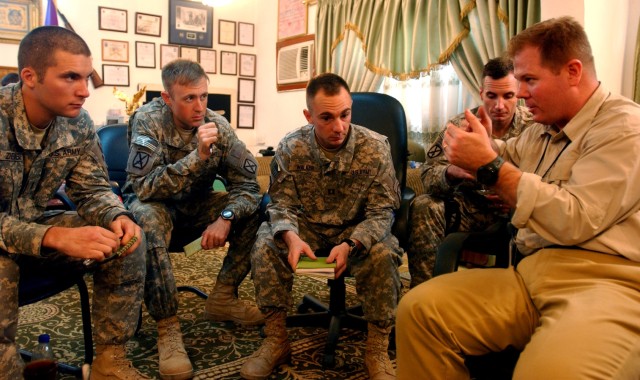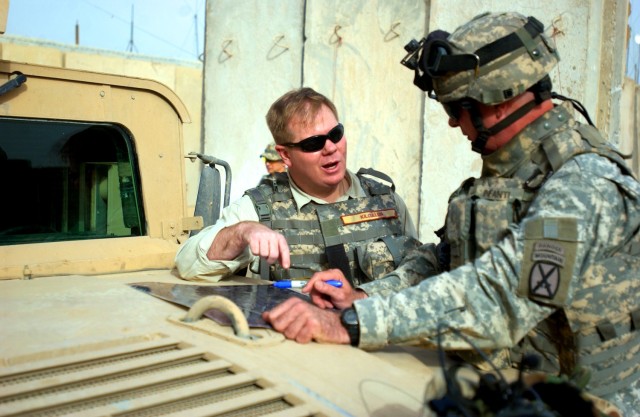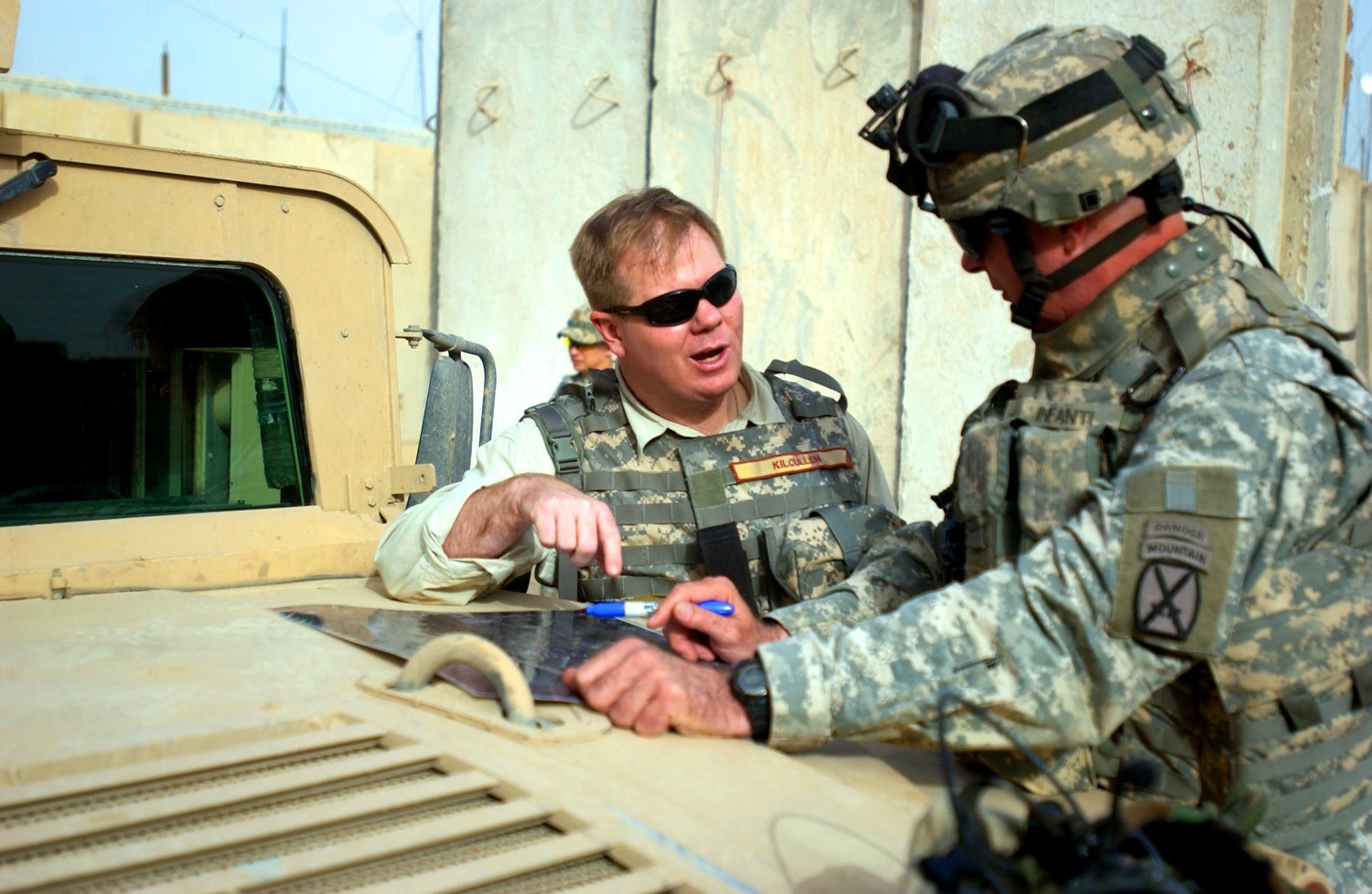CAMP STRIKER, Iraq (Army News Service, June 5, 2007) - Recruit more Iraqi Soldiers and increase their divisions from 11 to 20 is what one counterinsurgency expert said he would do if he was in the shoes of the Multinational Forces - Iraq commander.
Dr. David Kilcullen, an authority on counterinsurgency, was appointed to advise the MNF-Iraq commander, Gen. David Petraeus. Dr. Kilcullen visited Soldiers with the 10th Mountain Division's 2nd Brigade out of Fort Drum, N.Y., to take stock of the "Commando" brigade's progress June 2 and 3.
Dr. Kilcullen served 21 years in the Australian army and has led Timorese troops, was a special advisor for irregular warfare during the 2005 Quadrennial Defense Review, and remains a reserve lieutenant colonel in the Australian army.
Col. Michael Kershaw, 2nd BCT commander, escorted Dr. Kilcullen around Patrol Base Dragon, the Yusufiyah Joint Security Station and the Mahmudiyah Iraqi Army Compound.
"They've done a great job just setting it up," said Dr. Kilcullen of the JSS. "They've got the Iraqi army and Iraqi police working together, which is a great start, it's a good setup with the IPs doing municipal law and order, and the Iraqi army doing rural security. The next step is to set up a joint-operations room where they can plan operations together."
He observed that U.S. forces' performance is improving, although the situation has - at least temporarily - taken a turn for the worse.
"Your progress since the beginning of the year is substantial," Dr. Kilcullen said. "The trick now is putting the Iraqi structures into place. It's about sustainment and expectation management.
"The 10th Mountain Division is the most-deployed division in the Army today," said Dr. Kilcullen. "That experience really shows in your approach to the area of operations. This is a tough, unforgiving AO which punishes the slightest tactical mistake. I am extremely impressed with the way the brigade has approached the mission, and with the progress in this district, which is the best I have ever seen it."
Dr. Kilcullen also discussed ways to improve combined U.S. and Iraqi operations with Brig. Gen. Ali Jassim Al-Frejee, commander of the 4th Brigade, 6th Iraqi Army Division.
"What makes a local sheikh respect coalition forces more than terrorists'" Dr. Kilcullen asked. "Is it a case - like the Indonesians say - 'either silver or lead''"
"Either way is difficult," said Brig. Gen. Ali. "People are getting tired of Al-Qaeda in Iraq - they're tired of the ideology and killing. In Anbar, many tribes are fighting terrorism. We just need time to re-culture the people."
"I'm very impressed with your progress here," Dr. Kilcullen told him. "The last time I came to this area, we couldn't even drive here. It's very impressive."
Dr. Kilcullen asked Brig. Gen. Ali what he would do if he were in Gen. Petraeus' shoes.
"More Iraqi army soldiers," Brig. Gen. Ali said without hesitation. "Right now we have 200,000 troops. The first reason is that we need more soldiers watching and protecting the people. The second thing is that it would improve the economy and reduce the unemployment rate - and when people are poor, it's easy to recruit them for terror. In my view, Iraq needs 20 divisions instead of the 11 (they) have now."
Capt. Blake Keil, commander of Battery A, 2nd Battalion, 15th Field Artillery Regiment, 2nd BCT, spoke with Dr. Kilcullen about company-level operations.
"It's great to listen to him speak," said Capt. Keil. "And it's cool to see him here as an adviser to Gen. Petraeus."
"Everybody knows that July and August are going to be bad months," said Dr. Kilcullen, reminding several company commanders and other officers that Petraeus' plus up report, expected in September, will be a target for insurgents. "You should expect a spike in enemy activity. Civilian and U.S. Soldier deaths will look bad - I think we'll have a hot summer. But if we break (terrorists') backs, it might drop right after. You guys are an important reality check for what's going on, and you know things before division or corps-level people."
He encouraged lower-level leaders to trust their gut feelings and their Iraqi army counterparts.
"Even with Iraqi intelligence - if one of your Iraqi counterparts writes a one or two paragraph summary of what's going on, even if he can't justify what he expects, he knows his area."
He also reminded the leaders to keep notes for handing over to the next unit.
"I encourage you to write stories about your missions - everything from big issues to just personal recollections. Share them with the incoming guys, because they're valuable."
Dr. Kilcullen seemed genuinely impressed by the Commando leaders' accomplishments.
"You guys are doing one of the toughest jobs in this country, and I think you're doing it right. This brigade definitely 'gets it,'" he added. "They're doing it right. In this form of warfare, though, there are no shortcuts or gimmicks - it's all about keeping up constant, unremitting pressure over time. At the same time, you need to be alert to how the enemy and the environment is adapting, and constantly come up with new, entrepreneurial ways to work the area.
"At this stage of your tour, it's all about consolidation, improvement and getting to steady state so that you can hand over a well-controlled district to your successor unit."
(Spc. Chris McCann writes for the 2nd Brigade Combat Team, 10th Mountain Division Public Affairs.)




Social Sharing